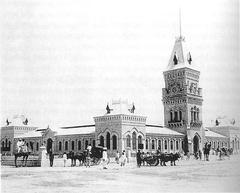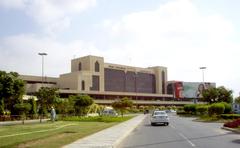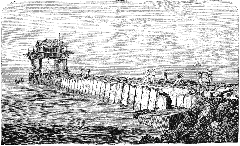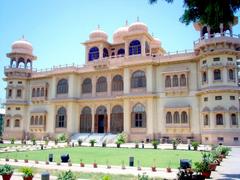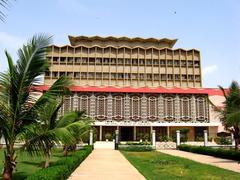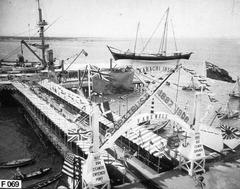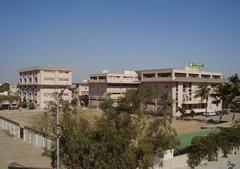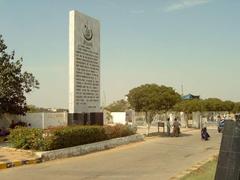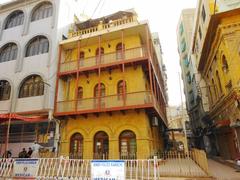Karachi Nuclear Power Plant: Visiting Hours, Tickets, and Tourist Guide
Date: 14/06/2025
Introduction
The Karachi Nuclear Power Plant (KANUPP) is a milestone in Pakistan’s journey toward energy self-sufficiency, technological innovation, and international cooperation. As the country’s first commercial nuclear facility, KANUPP has evolved from its original Canadian-designed reactor into a modern complex featuring advanced Chinese Hualong One units. Located near Karachi’s scenic Arabian Sea coast, KANUPP remains a high-security site, with public access strictly regulated. This detailed guide provides insight into the plant’s origins, significance in Pakistan’s energy landscape, safety protocols, socioeconomic impact, and practical visitor information, including access procedures and alternative attractions in Karachi.
Table of Contents
- Introduction
- Historical Overview of KANUPP
- Expansion: K-2 and K-3 Reactors
- Role in Pakistan’s Energy Sector
- Safety and Regulatory Oversight
- Socioeconomic and Technological Contributions
- Visiting KANUPP: Hours, Tickets, & Travel Tips
- Alternative Attractions & Travel Recommendations
- Frequently Asked Questions (FAQ)
- Conclusion
- Sources and Further Reading
Historical Overview of KANUPP
KANUPP’s journey began in the mid-20th century when Pakistan established the Pakistan Atomic Energy Commission (PAEC) in 1956 as part of the global “Atoms for Peace” initiative (Discover the Green Tech). In 1959, PAEC signed an agreement with Canadian General Electric Company to construct a 137 MWe CANDU reactor in Karachi (South Asian Voices). The Karachi Nuclear Power Plant-1 (KANUPP-1 or K-1) began operations in 1972, making Karachi the first Pakistani city to benefit from nuclear-generated electricity (South Asia Monitor; Power Technology).
Expansion: K-2 and K-3 Reactors
Technology and Construction
With rising national energy demands, Pakistan partnered with China in the early 2010s to expand KANUPP through the K-2 and K-3 projects (World Nuclear Association). Construction began in 2015 (K-2) and 2016 (K-3) (World Nuclear News), utilizing Chinese Hualong One (HPR1000) third-generation pressurized water reactors, each with a net capacity of 1,100 MWe (ANS News). These reactors feature robust safety systems, long design lives, and enhanced operational efficiency (Power Technology). The expansion was financed primarily by China, with significant support from Pakistan’s public sector.
Operational Milestones
K-2 achieved first criticality and grid connection in early 2021, with commercial operation commencing in May 2021. K-3 followed in 2022, with commercial operation starting in April of that year (World Nuclear News). The original K-1 was decommissioned in 2021 after nearly five decades of service.
Role in Pakistan’s Energy Sector
KANUPP is pivotal to Pakistan’s energy security, with a combined capacity of 2,200 MWe from K-2 and K-3—about 10% of the country’s total electricity generation (Power Technology). The plant’s annual output of nearly 20 billion kilowatt-hours serves approximately 2 million residents (China Daily). Environmentally, KANUPP’s clean energy output replaces the need to burn millions of tons of coal, averting over 16 million tons of CO2 emissions annually (World Nuclear News). The plant’s expansion is also a model for Belt and Road energy cooperation (SASAC).
Safety and Regulatory Oversight
KANUPP operates under stringent regulatory controls. The Pakistan Nuclear Regulatory Authority (PNRA) manages licensing and operational oversight, ensuring compliance with International Atomic Energy Agency (IAEA) standards (PNRA). The site has undergone rigorous hazard assessments for seismic and tsunami risks (PNRA Report, 2022), and its reactors include state-of-the-art safety systems (World Nuclear News). The IAEA recognizes Pakistan’s strong nuclear safety record (South Asia Monitor).
Socioeconomic and Technological Contributions
Construction and operation of K-2 and K-3 have created over 60,000 jobs and fostered the development of local expertise and infrastructure (World Nuclear News). The expansion has prompted upgrades to the national grid and inspired continued nuclear development, with Pakistan’s Energy Security Plan targeting 8,800 MWe of nuclear capacity by 2030 and 44,000 MWe by 2050 (South Asia Monitor).
Visiting KANUPP: Hours, Tickets, & Travel Tips
Access Policy and Visiting Hours
KANUPP is a high-security site; public visits are not permitted. Access is strictly limited to approved educational groups, researchers, and official delegations, subject to clearance from PAEC and the Ministry of Interior (PAEC Official Website; PNRA). No ticketing or regular visiting hours are available. Those seeking access must apply well in advance, providing identification and undergoing background checks.
Security Protocols
Visitors with approved access must comply with stringent security measures, including identity verification, baggage screening, and escorted movement within the facility. Electronic devices and photography are generally prohibited.
Travel Tips
KANUPP is located approximately 18–25 km west of Karachi near Paradise Point (Power Technology). While the plant itself is inaccessible, the surrounding coastal region offers scenic views, though Paradise Point beach is now closed due to security concerns.
Alternative Attractions & Travel Recommendations
With public access to KANUPP restricted, visitors can explore Karachi’s rich array of cultural and natural sites:
- Clifton Beach: A vibrant urban beach with recreational activities.
- Sandspit and Hawke’s Bay: Popular coastal destinations for swimming and picnicking.
- Pakistan Maritime Museum: Offers maritime and naval history exhibits (Pakistan Maritime Museum).
- Mohatta Palace: A historical museum featuring art and cultural displays.
- Quaid-e-Azam Mausoleum: The resting place of Pakistan’s founder.
Educational events and science exhibitions in Karachi’s universities and institutions provide further insight into Pakistan’s nuclear program.
Frequently Asked Questions (FAQ)
Q1: Can the public visit the Karachi Nuclear Power Plant?
A: No, the plant is a high-security facility. Only pre-approved educational or official groups may arrange tours through PAEC.
Q2: Are there tickets or regular visiting hours?
A: No public tickets or visiting hours are available.
Q3: How can an official visit be arranged?
A: Through formal application to PAEC, subject to security clearance.
Q4: Is photography allowed at KANUPP?
A: No, photography and electronic devices are generally prohibited inside the facility.
Q5: What are alternative attractions near KANUPP?
A: Clifton Beach, Sandspit, Hawke’s Bay, Pakistan Maritime Museum, Mohatta Palace, and Quaid-e-Azam Mausoleum.
Q6: Where can I learn about Pakistan’s nuclear achievements?
A: Through official PAEC resources, museums, and educational events.
Conclusion
KANUPP stands as a testament to Pakistan’s commitment to clean energy, technological advancement, and international partnership. While public access to the facility is highly restricted, Karachi offers a wealth of alternative attractions and educational experiences for those interested in the nation’s scientific heritage. Prospective visitors are encouraged to consult official sources for the latest updates and to plan their trips around Karachi’s rich cultural, historical, and coastal sites. For ongoing updates and travel resources, download the Audiala app and follow official channels.
Sources and Further Reading
- Discover the Green Tech
- World Nuclear Association
- PAEC Official Website
- PNRA
- Karachi Tourism Guide
- World Nuclear News
- Pakistan Maritime Museum
- PNRA Report, 2022
- South Asian Voices
- South Asia Monitor
- Visit in Pakistan: Karachi Attractions

